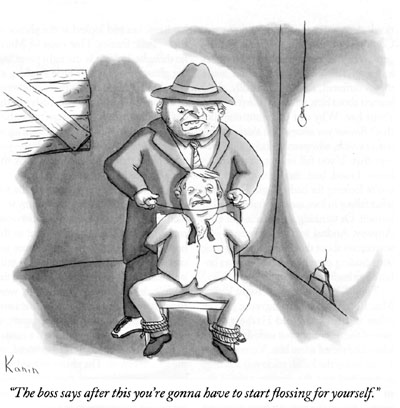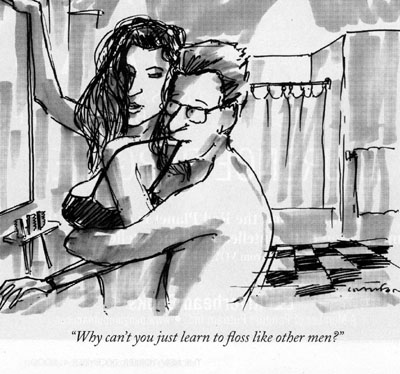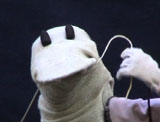
Send your question to Dr.T@flossing.org
Your Flossing Questions, Answered...
Go back to Page 1
Dear Dr. Tartaroff,
We have some important questions about dental floss and many important people in the dental and tooth world.
- What is the association between the Flossing Council and the Tooth Fairy? Is she an employee, consultant or board member?
- We often get coins from the tooth fairy during the night we lose a tooth. Why don’t we receive dental floss? Or at least dental floss coupons?
- The tooth fairy works very hard every night of the year. Or does she get a day off on Christmas and Christmas Eve. My bother lost a tooth on Christmas Even and never got coins. Mom and dad said to wait a day. What about Easter and other holidays?
Please answer our important questions.
Sincerely,
A few students at Nottingham Elementary,
Arlington VA
Dear NE Students,
Thank you for your interesting questions about the Tooth Fairy.
Allow me to briefly summarize your questions:
The Tooth Fairy – who is she, who does she work for and when does she work?
The Tooth Fairy is a legend in the dental care industry – a totally independent agent. In some countries, like France, the Tooth Fairy is thought to be a mouse that turns into a Fairy to do her work. Here in the US, she doesn’t bother with the mouse stuff very often, but, being a Fairy, she certainly could use it, if she needed to hide.
The Tooth Fairy typically leaves money for each tooth she collects, but it’s not clear where the Tooth Fairy gets her money. We suspect she inherited it from a family of dentists. In 2009, they’ll be a new movie called “Tooth Fairy” starring Dwayne Johnson, “The Rock.” Perhaps her agent got her some money from the movie's producers for using her name.
The Flossing Council would love to work with the Tooth Fairy, but being independent as she is, that’s not easy to do! You ask about when she works. That’s something else that comes with independent agents like the Tooth Fairy – they get to set their own hours and their schedule. Sort of like when you call a plumber or the telephone company – you just have to wait.
Your thought on the Tooth Fairy leaving dental floss is great! We’re going to work on that one! Perhaps the Tooth Fairy could leave a little package, holding some dental floss (and some cash). We may have some of those little packages printed up, so the Tooth Fairy can leave them for little girls and boys who lost a tooth.
Thanks very much for writing! Good luck with the Tooth Fairy and your New Teeth!
Best wishes,
Dr. T.
Dear Dr. Tartaroff,
I have a problem! I like to floss, but my teeth are rather tight, so I use a PTFE* (monofilament) floss most of the time. I’ve had a couple of annoying incidents when a polyfilament floss has shredded between my teeth and left me struggling to clear it out.
My problem is that I do have two big spaces in between certain teeth and the monofilament floss doesn’t work very well at getting those spaces clean.
Do I have to become a two floss guy – monofilament for most teeth and a special followup with a bulkier floss?
Sincerely,
Mixed Space Guy
Dear MSG,
If it’s any consolation to you, you’re not alone with your problem. Personally, I have so much space between my teeth I sometimes look longingly at the ropes that are used to tie up ships. But many people have the tightly spaced teeth you describe that can only fit the slippery and durable monofilament flosses between most of them, but they also have one or more bigger gaps that don’t get cleared with a PTFE floss.
The best flossing answer I know for your problem was shared with me by an engineer, Taber MacCallum (who is also noted as one of the eight people who lived in the Biosphere for 2 years, between 1991 and 1993).
Taber suggests tying a knot in the PTFE floss.
For your tight teeth you use the unknotted segment, and then pull the knotted floss through the bigger spaces to clean them out. Taber also pointed out another advantage of the knotted PTFE floss - it also works for those teeth that are close together but have a big “food trap” gap near their base. The PTFE floss can get between the teeth and the knot clears out the open area that can hold some stubborn food debris.
I think Taber has come up great solution for the mix spaced people like you!
Please try it out and send me any additional comments you might have on how it works.
Best of Flossing!
Dr. CT
PS: PTFE stands for Polytetrafluoroethylene (aka Teflon; Gore-tex; Tyvek).
Dr. T,
In trying to convince my 20 year old son to floss everyday rather than perhaps weekly he stated that I am 1 in 100 who try to floss daily. I told him I think the percentage is much higher but I'm looking for some statistics or surveys to support my case. Can you provide any assistance? Thanks for any help you can offer.
Flossing Dad
Dear FD,
I’m not sure your efforts to promote flossing by your son requires numbers as much as some suggestions about how to get your son to enjoy flossing.
First, have you ever noticed how most people react to statistics? - If the statistics agree with what the person already thinks, the numbers are fine and noteworthy. If the statistics introduce conflicting evidence, then the statistics are suspect and ridiculed.
Now regarding the number of people who floss regularly, even if we limit our question only to the USA, I’m not sure how we’d get good numbers and I’d be prepared to question any that were being circulated.
Here’s part of my reason for being a doubter: Have you heard about the difficulty researchers have had getting medical personnel to report how often they wash their hands? Studies have shown that doctors and others who deal with the sick don’t wash their hands nearly as often as they should – but being busy and well intentioned, they report a lot more washing than they actually do.
So, when people report flossing, how do we know they actually flossed and aren’t just saying what their dentists and loved ones might like to hear?
To me, your note suggests your son doesn’t like to floss, and that may be the most useful place to focus your attention. If your son liked to floss, he’d be proud of having such an exceptional Dad – imagine how he’d react if you were one of the top 1% of home run hitters – that would be no problem. But flossing seems to be a negative thing for him.
Why do some people like flossing so much more than others? If you have teeth spaced widely enough to catch chunks of food, flossing feels great, because it can quickly clear all the big stuff between teeth. That’s an immediate winner for some people. But all those who have tight teeth don’t catch nearly as many mega particles of food and they have a tough time even getting floss between their teeth.
Ok, regarding your son - Have you started him with a non-shredding monofilament floss? (Big brand examples are “Colgate Total” and “Creast/Glide”, but less costly house brands are also available.) As I note elsewhere, the only thing worse than food stuck between your teeth is floss stuck between your teeth.
How can he tell if he’s flossing enough? - Here’s a concrete test he can use:
When he flosses, does he mobilize smelly gunk?
Anyone who regularly finds debris that could be called a “Pearl de la Sewer” when they floss, needs to floss more often. That smelly stuff between your teeth can cause bad breath (a real relationship killer), gum disease, and promote decay. My experience suggests that with regular flossing (once a day; maybe more after meals with “flossogens” like chicken and corn), the amount of smelly debris can be fully controlled.
When your son can floss without discomfort and he appreciates how regular flossing can help his mouth and even his relationships, he’ll floss as often as needed – and that’s really a goal for all of us.
Good luck with your efforts!
Dr. T.
The New Yorker:
Thanks Dan, Libby, David, Bernie& Eleanora!
(To buy a print, click the cartoon.)



Dear Dr. Tartaroff,
Flossing is good. Sometimes it is too good. I was soon out of dental school, and began to practice (literally) with my father who was a dentist in Farmingdale, Long Island, NY. One of my first patients was a young man, early 20s who had beautiful teeth, nary a cavity, but, strangely, all the gum tissue between his teeth, the gingival papillae, were "punched out", gone, depressed. Yet, his gingival tissue was pink, firm and healthy. I noted this to him and asked if he was aware of the condition. He replied, "Oh yes, you see, I was told by my former dentist that I should use dental floss because it prevented cavities. So, I figured if a little floss was good, a lot was better. So, you see, I tie knots in the floss and pull it through to make sure I get the teeth good and clean."
I looked him straight in the eye and said, "My advice to you, young man (we were probably the same age) is to throw out your floss, never use it again; but if you do use it, don't tie any knots, just put it through the contact, and for heaven's sake, don't saw, just move it up and down against the fronts and backs of the teeth. You're one of those unique humans who've never had a cavity. You're doing yourself more harm than good."
My concern was that with his literal compulsion to follow the good doctor's advice, even if he didn't tie knots, he'd probably use a sawing motion that might wear grooves on the proximal surfaces. Since he was, in those days, uniquely caries-free, flossing was, in his case, doing more harm than good.
Here’s my question: Do you worry that your advice might make some people floss too much?
Sincerely yours,
Jay
Jay W. Friedman, DDS, MPH
Los Angeles, CA
Dear Jay Friedman,
Thanks for sharing such an important story and your advice!
It is troubling that too much of anything can do harm – and of course that includes flossing.
We recently posted a little jingle for National Flossing Day that had Smiley, the Muppet, flossing in a way that should only be done if you have a head made out of a sock!
For most of the world, the absence of flossing seems to be a major problem, but for those of us who floss, we can do our teeth damage if we floss too frequently – especially if we “saw” back and forth along the edges of teeth with floss.
It may be useful to keep in mind a news story from a few years ago about a prisoner who used floss and toothpaste to saw through the bars of his cell and escape. The power of friction and a mild abrasive can cut through many things, and certainly the thin layer of enamel on the outside of teeth.
Perhaps a way to keep flossing in perspective would be to consider that eroding teeth and harming your gums is not a path to “Peace of Mouth.”
Thanks again for your letter Jay!
Chip
PS. Jay, I greatly enjoyed your recent article on the needless extraction of wisdom teeth!* (To download a copy click here.)
Floss on!
*"The Prophylactic Extraction of Third Molars: A Public Health Hazard. American Journal of Public Health 97:1554-59, 2007.

click here for the video
Youngest Age to Start Flossing?
Dear Dr. T,
Hello my name is Scott Wilson from hervey bay Qld Australia. Any way to the point - I have a friend with an 8 year old. We had a conversation about flossing and she stated that most dentists that she has seen told her that if her child was to floss now or even younger it would put gapes in-between the teeth and damage the gums. I stated she is talking from her back side. Can you clarify this for me please?
Thank you
Scott Wilson
Dear Scott,
I can’t verify where your friend is talking from, but regarding the earliest age to floss, there’s a lot of opinion that children can start flossing much younger than age 8.
The venerable American Dental Association (ADA) - which will never be classified as a radical group - states on its web site and in it’s educational material, that parents should start flossing their children’s teeth “as soon as the child has two teeth that touch.”
That’s a lot younger than age 8, which by itself doesn’t seem like a problem to me. But I do think there are several important matters to keep in mind with children and floss:
- Use a non-shredding (monofilament) floss! - Don’t afflict a child with shredded floss stuck between teeth.
- Don’t making flossing a painful experience! Start by making it more like a simple game – flossing one tooth and making it fun will be much more productive than waging a battle over a thorough flossing.
(The ADA has a fun flossing demonstration for children that involves the kids using the fingers as symbolic teeth, and yarn to represent floss.)
There is some debate about when children can floss on their own. Ages of 8 to 10 are mentioned in some articles, but I wouldn’t be surprised that there are quite a few “flossing prodigies” out there who can handle floss by themselves at much earlier ages (Parents: Send us pictures of your child flossing and we’ll post them here!).
Concerns about over-flossing (and brushing) should be kept in mind, but they’re not likely to be a problem for many children. Flossing once a day is a healthy rate, which will do a lot of good and little harm. Flossing, like brushing, should also be done after eating certain foods (“flossigens”) that are particularly likely to get stuck between teeth - whenever a parent or a child is bothered by such debris.
Like adults, some children are not going to enjoy or even want to deal with flossing. Children and teens tend to have more tooth decay than adults. It probably has a lot to do with “live and learn.”
Of course, children are likely to mimic their parents – if they see you flossing regularly, there’s a good chance they’ll be interested in flossing too. Sometimes, however, all you can do is offer and wait. Teaching kids to floss is one more of the many challenges of parenting.
Good luck!
Chip T., DDF.
PS: We asked our friends at www.Brownielocks.com - a fun kid's website - for comments about kids and flossing. Here are some additional tips:
Start with the two front teeth, so you don't have to reach inside the child's mouth. Some children fear choking, and the simpliest approach will avoid this problem.
There are several flossing devices around that promise to make flossing easier, but watch out, some have terrible, easy shredding floss in them!
It's up to each parent to decide when their children should floss - probably the sooner the better.
Thanks, Sheila!
PPS: Here's a picture of a 15 month old, who insisted on flossing her only two teeth, when she saw her Dad flossing.
Floss or Brush First?
Dear Dr T,
I am a retired dentist, and not only floss but make sure I remove food from between my teeth before brushing to help fluoride and saliva access to neutralise acid and repair demineralised tooth.
Do you think that it is best to floss twice a day at home after breakfast and after evening meal, before brushing with fluoride toothpaste.
Regards
Maurice White BDSc Melb
Dear Dr. White,
Thank you for writing and asking such a pertinent flossing question!
You are, as you mention, one of us who flosses thoroughly before brushing. I admit my bias on the matter, because it seems logical to me that large chunks of food be removed by flossing, before attempting to clear away remaining particles with the fibers and suds that typify a good brushing.
Some people do prefer to floss after brushing, and I suspect, despite my personal bias, whenever you floss, you're doing a lot of important cleaning. If you're a reader who prefers to brush first, you should continue enjoying your dental routine, and we'll enjoy our own.
You also ask, "Do you think that it is best to floss twice a day at home after breakfast and after evening meal, before brushing with fluoride toothpaste?"
Well, Dr. White, I think twice a day is a healthy frequency for flossing, but, honestly, if I eat a food that sticks between my teeth during the day, I'm not very comfortable until I clear that food out by flossing.
Do I need to be at home to floss? Not necessarily. I look forward to the day when there are more opportunities to floss after meals, with discretion, in public places. Some National Flossing Council volunteers have sent me photos of public floss dispensers that are placed outside of restrooms in steak houses in Brazil, so patrons can clean their teeth after they dine (we'll be posting a page on Brazilian flossing very soon). Flossing at home, twice a day is excellent. But, we must also think of travellers and those who need access to floss while living a hectic life. Floss should be as available as other health and dental aids for those away from home.
Here at the NFC, we hope to see a world where floss is a commonplace, enriching part of daily life, in homes, offices and wherever people live their lives!
Thank you again for writing! You are a very welcome addition to our current cadre of enthusiastic Australian members of the NFC!
Best wishes,
Dr. T.
PS: Good luck with your fun educational web site Supertooth and Good Food Friends!
Ooo - The Smell!
Dear Dr. T,
Mock congratulations are in order for me today. I was just informed this morning that I will require my first root canal. I'm rather ashamed of myself at this point, but I made my bed, so now I must sleep in my dirty sheets.
It seems that a filling of mine from several years ago had fallen out. I've been walking around for the past year, at least, with the innards of my tooth exposed to the elements. No wonder I was in pain when it got cold! At any rate, I have learned my lesson. I floss often, but I don't floss every day. This can't be allowed any more. It will become an addiction...
Here's my question: I read your comments about flossing in public. Most people I know find that flossing in public is as unsanitary and gross as toenail clipping. Why? Because of the food particles that pop out without control? While I think it's rather important to floss whenever and wherever you can, I wonder if flossing so close to another, as you would on an airplane, is sanitary?
Also, when I floss, I can smell the tartar in the air. Tartar has an extremely bad odor. What can do to avoid having this smell emanate from my mouth? Does coffee contribute to it? Cigarettes? Whatever have to do, I will do...
Sincerely,
Really Interested in Changing Habits
Dear RIICH,
Sorry to hear about the root canal! Sometimes (many times, really) we need a serious event before we realize our responsibilities - and that's not a life lesson only limited to our teeth. I have a few root canals and a lot of fillings. That's probably how I got to be such a regular flosser.
You ask if flossing in public might be unsanitary. My guess is no - certainly not compared to shaking hands or kissing. But anything we do in close proximity to someone else is likely to annoy them, if we don't get an ok first - and flossing is certainly on that list of behaviors. So, all we can do is ask. Consideration would also suggest that if the flossing becomes a splaying of recent dinners (do you remember the scene in "Kingpin" when Randy Quade flosses for the first time with Woody Harrelson?), it would best be done in private, and in a place that you can clean afterwards.
Regarding the smell of tartar after you floss - there is one definite cure for that problem - floss regularly! Even I occasionally unearth an area where some residual food and bacterial growth generates the odor you're experiencing, but I'm sure you'll find that happens less and less as you become a regular flosser.
Thanks for writing!
Best wishes,
Dr. T.
Flossing In Public?
Dear Dr. Tartaroff,
As an avid flosser I often find myself needing to floss in public places. Recently on an airplane trip I wanted to floss as we were landing (I couldn’t use the restroom), but I didn’t know if I would offend the person sitting next to me. I held back from flossing and ran into the nearest restroom as soon as I left the plane. I hadn’t talked with the person during the trip and felt hesitant to start with my request to floss.
A Traveling Flosser.
Dear ATF,
Your sensitivity is admirable, but to me it seems excessive. This is the 21st Century. The discussion and media ads for AIDS prevention has broadened the public tolerance for topics that still make sailors wince. Why assume that you are the only flosser on the plane? You might have been pleasantly surprised and found that your fellow passenger was also a flosser.
When I’m in a situation like that, I use a variation on the routine Humphrey Bogart would use to offer a cigarette to a companion. First you produce a floss container and make it obvious. Cigarette smokers might tap the pack a few times to tamp the tobacco. Similar moves with floss containers are rarely needed. Then you offer some floss to your companion. If floss is accepted you and your companian merrily share a flossing moment. If the floss is declined, simply ask, “Do you mind if I floss?”
Please respect the wishes of anyone in the vicinity who might have to witness your flossing. Remember, to the people around you, you are the Ambassador of Floss. Just as every foul smoker has alienated dozens of non-smokers, your consideration will reflect good and bad, on all flossers. Wear your Mantel proudly, but show proper dignity for your position. Floss-on!
Where's My Floss?
Dear Dr. T:
I’m a person whose teeth are spaced just wide enough to hold amazing amounts of food after I’ve eaten. For me, I’m physically unnerved if I can’t floss after a meal. Now say I lie down in front of my TV, and then think about flossing. I hate to get up and find my floss. When will there be a floss dispenser for the TV room?
TV Flosser
Dear TVF,
Have you checked out the Flossing Art section of MouthWatch? Camille Scribner has created a beautiful floss container for use in a TV room or even the most elegant of living rooms. In the future we hope to see similar floss dispensers being sold for various parts of the home. The problem I have isn’t getting access to floss, because I keep floss dispensers in most rooms of my home. My problem is what to do with the floss after I’ve finished using it. Some people suggest that the reason public control of cigarette smoking has become so harsh is the amount of abuse that developed between smokers and nonsmokers. We don’t want little balls of used floss to be seen as the cigarette butts of flossing. What we need is a technological solution - a device that will work like the diaper genie, taking in floss and discretely storing it for later disposal. In the meantime, get yourself a TV room floss dispenser – and watch your butts.
How To Floss?
Dear Dr. T.:
With your professional title, DDF (Doctor of Dental Flossing), you’re the guy to ask this question: How should I floss?
Sue (Rochester, NY)
Dear Sue,
My years of study and professional experience with floss have made me something of a Taoist when it comes to answering your question.
Taoism would accept all flossing as right and good and be hesitant to interfere with the specifics of the process. Perhaps Taoism isn’t right for you at the moment. Perhaps you’d like the answer a Methodist might give (Click here for a link), or a tight-toothed Episcopalian (Click here for a link)? Perhaps you'd like a video to show you?
How about we agree on the goal of flossing, and leave it to each one of us (or our parents) to figure out what needs to be done?
Proposed “Goal for Flossing” – "Take a piece of string and use it to clear food and plaque from between teeth and under gums, in spots a toothbrush can’t reach.”
Let me know how that works for you and if I left anything out.
Before closing, I would like to make some general comments about flossing:
- The only thing worse than food stuck between your teeth, is Floss stuck between your teeth.
- If you never floss, or don’t have much space between your teeth, use a monofilament floss (like Glide ) that won't shread.
What is "Peace of Mouth?"
Dear Dr. T.,
I’ve been hearing about “Peace of Mouth” lately, and I have no idea what that means. Perhaps you could help me understand this dental matter.
Thanks,
Cary
Dear Cary,
Wow! Talk about tough questions!
Peace of Mouth is discussed elsewhere on this site. I can’t reference many other citations, at the moment.
Your question is a very old one, however. Consider this translated quote from about 1700 years ago attributed to Chuang Tzu*:
“When the shoe fits, the foot is forgotten.”
“Peace of Mouth” is a state in which you forget your teeth. Then you’re enjoying your mouth in the same way you’re enjoying your liver.
The “Help Spread ‘Peace of Liver’” movement is outside the scope of this column.
However, once you achieve “Peace of Mouth”, you’re freed from dental distractions and life is more fun. Flossing is one of the tools that can lead to this freedom and fun.
Floss on!
*The Way of Chuang Tzu by Thomas Merton, New Directions, 1965. p. 112.
Flossing Can Be Good For Your Health!
Dear Dr. Tartaroff,
I'm 14 years old and my girlfriend is always on my case because I don't floss. She says that if I don't floss, my teeth will fall out; I'll be ugly like a hockey player, and I'll never get a job. I'm afraid of losing her (almost as much as growing a mullet), but the trouble is, I'm Floss-a-phobic! I've heard that flossing can give you a heart attack! Can you shed some light on the real health risks of flossing vs not flossing?
Sincerely,
'Fraid O' Floss
Dear FOF,
First of all, on questions regarding mullets, click here. Second, while a girl may break your heart, flossing never will. In fact, there are indications that flossing may help prevent some types of heart disease! But don't let this be a reason to rest on your flossing laurels. Flossing means healthy vibrant gums, healthy gums will help you have a knock'em-dead smile - and your smile will help you charm the girls. That certainly seems to be what your girlfriend is hoping for. Take it slow - Just try flossing once a day. Don't floss just because of her pressure, but don't be afraid to floss. Eventually, you, like many others, can experience the joy de'floss that comes with regular flossing. Good luck! Thanks for writing!
Do you have a pressing question about floss and it’s proper uses? Send your question to Dr.T@flossing.org
Sketch of Dr. Tartaroff by Larry Bencivengo

Page 1